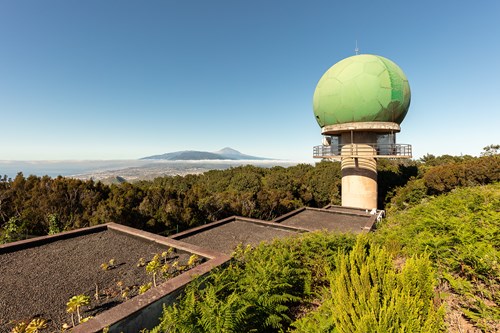ENAIRE launches Green Sky, its new environmental strategy for sustainable aviation
The Board of Directors of ENAIRE, Spain's air navigation service provider, has approved its environmental sustainability strategy as part of its Strategic Plan, 2025 Flight Plan.
With this new strategy, called "Green Sky", ENAIRE wants to contribute to more sustainable aviation and air transport through all kinds of activities and improvements involving air traffic management.
One of the goals of the 2025 Flight Plan is sustainability: "Contributing to sustainable mobility in the air transport sector by minimising the impact of ENAIRE's activity on the environment and committing to its decarbonisation".
This goal translates into the "Green Sky" environmental sustainability plan, which contains three initiatives: Fly Clean, Fly Quiet and Eco-ENAIRE.
Fly Clean
Fly Clean is ENAIRE's initiative to reduce aircraft emissions by improving the efficiency of flights operating in Spanish airspace.
ENAIRE's strategy will prevent the release of 185,000 tonnes of CO2 over five yearsHorizontal flight efficiency will reduce the distances and times of air routes and taxi distances at airports. It will do so by relying on civil-military coordination to optimise the route network, which will enhance the flexibility of the airspace set aside for defence purposes, and implementing free routes to provide for direct, point-to-point flights within Spanish airspace.
To improve vertical efficiency, ENAIRE is proposing take-offs and landings with continuous climbs and descents, as well as the use of optimal flight levels.
These more direct routes will save 9.8 million kilometres from 2021 to 2025, equivalent to circling the Earth 246 times. They are also estimated to save 58,500 tonnes of fuel, reducing airlines' costs by 18.7 million euros in the process.
Over this period, the more direct routes will avoid the emission of 185,000 tonnes of CO2, equivalent to the CO2 absorbed by 9.2 million trees.
Fly Quiet
Fly Quiet is ENAIRE's initiative to reduce the noise that can negatively affect people and biodiversity.
To this end, ENAIRE is working to design more efficient routes based on satellite technology (PBN) in order to avoid flying over cities and towns, and is conducting a systematic analysis of the possible acoustic effects of each air manoeuvre project.
With regard to biodiversity, ENAIRE is analysing the potential effects, especially on birds in protected natural spaces.
The result will be a reduction in the acoustic effects associated with air traffic and a lower impact on biodiversity thanks to a detailed analysis of 100% of ENAIRE's projects.
Eco-ENAIRE
Eco-ENAIRE is ENAIRE's initiative to reduce emissions from its own facilities by using renewable energies, upgrading to more efficient vehicles and other energy efficiency and circular economy actions.
Since 2015, 100% of the energy used by ENAIRE has come from renewable sources. ENAIRE will promote renewable energy and self-supply. This is expected to result in 13% of its energy being self-supplied with respect to its 2020 consumption. ENAIRE also hopes to reduce its total energy consumption by 10% compared to 2011.
Photovoltaic plants will be installed in the centres with the highest consumption, as will alternative sources in ENAIRE buildings (wind, geothermal, etc.).
Lighting consumption will be reduced by introducing more efficient alternative technologies, promoting the circular economy by including sustainability criteria in purchasing procedures and in waste recycling and reduction processes, as well as in its buildings, and by phasing out carbon from its vehicle fleet.
Importance of the aviation sector in society
Air transport plays an important role in economic and social development. One of its current and future challenges is its environmental sustainability.
The sector generates significant social and economic benefits by connecting society. It is a leading creator of employment and it supports economic development in Spain, Europe and all over the world.
In Spain, the air transport sector accounts for 1.8 million jobs, provides 109 billion euros to the gross domestic product and moves 275 million passengers (source: ATAG 2020 with 2019 data).


.png)




.jpg)



Comments
There are no comments yet for this item
Join the discussion